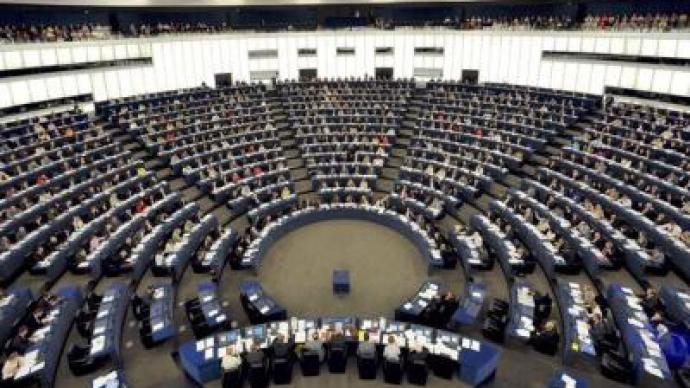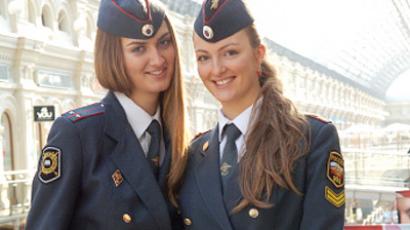Russia slams "hypocritical" EU resolution

Moscow is up in arms over a resolution adopted by the European Parliament on Thursday, with one lawmaker calling it “presumptuous interference” in the country’s internal affairs.
The resolution, which opens up by reaffirming that “Russia remains an important partner for the European Union,” goes downhill from there as far as diplomat backslaps are concerned. The second resolution mentions the brutal terrorist attack on Domodedovo International Airport last month that resulted in the deaths of 36 people and dozens wounded.“The European Parliament…strongly condemns the terrorist attack at Moscow’s Domodedovo airport and expresses its condolences to the families of the victims and its solidarity with those wounded in the attack,” the resolution reads.Then, and irrespective of the fact that the suicide bomber has already been identified, and his family members arrested in connection with the attack, the report stresses “the need for the Russian authorities to respond to this attack in a lawful and measured way and…allow the Russian judicial system to work freely and independently to prosecute and convict those responsible for the attack.”Lecturing Russia – or any country for that matter – on how it should respond to the perpetrators of terrorist attacks occurring on its own soil is guaranteed to stroke the hair of the Russian bear in a disagreeable way.After all, when the cities of New York, London and Madrid, for example, were visited by barbaric acts of terrorism, Moscow did no more or less than the situation called for: it offered its sincere condolences and assistance without being presumptuous enough to tell the officials of those foreign states how to conduct their investigations and punish the criminals. "No matter where such inhuman crimes are perpetrated – in London, New York or Moscow – they should be categorically condemned," then President Vladimir Putin told former PM Tony Blair in the aftermath of the terrorist attacks on London’s Underground. "All civilized countries should unite in the fight against international terrorism."Meanwhile, considering that dozens of suspected terrorists are quietly rotting away in the legal purgatory known as Guantanamo Bay, it seems that Russia should have taken the opportunity to offer Europe and the US some pointers on international law (Although US President Barack Obama promised to shut down this Cuban outback of American arrogance once in office, “Gitmo” remains open for business, while the detainees will be “brought to justice” in closed military tribunals). More importantly, however, is the question: how did the detainees from the Bush administration’s War on Terror get to “Gitmo” – a place that Amnesty International has rightly called “the Gulag of our times”? The incredible answer is: with a lot of help from the same European countries that are now lecturing Russia on human rights and respect for international law.It is no longer top-secret information that a handful of European countries participated in “extraordinary rendition” flights of suspected terrorists to Guantanamo Bay. But that was only phase two in the operation. Before those “unlawful military combatants” were secretly whisked out of various European airports to Guantanamo, they were treated to favorite medieval pastimes like “water boarding” at various “black site” prisons in Eastern Europe, believed to have existed in Poland and Lithuania (Ironically, we know the location of the concentration camps and the gulags, but nobody yet in this age of democracy and transparency has been able to say for sure where these black-site dungeons were operating).Thus, it is beyond hypocritical that the European parliament would criticize Russia’s “unfair procedures and failures to investigate serious crimes such as killings, harassment and other acts of violence” when such inhumane activities were happening on their own territories. A bit further down in the report, the EU parliamentarians express “serious concern at the verdict in the recent second trial and conviction of Michail Khodorkovsky and Platon Lebedev,” with the call for “an independent judicial review to be conducted in connection with the pending appeal against the verdict.”It adds that the European Parliament “demands that the Russian authorities do all in their power to improve the judicial system.”Former Yukos CEO Mikhail Khodorkovsky, 47, and his partner Platon Lebedev, 54, were found guilty of tax evasion on May 31, 2005 and sentenced to 8 years in prison; a new trial, however, was opened in March 2009 following the introduction of new charges of embezzlement and money laundering. In December, Khodorkovsky and Lebedev were found guilty and sentenced to 14 years in prison, which, taken together with time already served, they may be released in 2017. Attorneys for the two men are appealing the sentence.Medvedev has already stated that he would be willing to support an independent judicial review of the Yukos case if it were found to be necessary. Meanwhile, the Russian president has repeatedly declared that reform of the Russian judicial system is a top priority of his presidency. This year alone, Medvedev has introduced a new Police Bill, which is set to go into effect March 1, followed by the introduction of an anti-corruption bill that will dramatically increase 100-fold the penalties for individuals found guilty of giving and taking bribes. Naturally, it comes across as presumptuous and overbearing when one country attempts to lecture another country on how best to punish individuals found guilty of committing serious crimes. After all, Russia is certainly not the only country in the world that has imprisoned white-collar criminals. In a recent interview with Bloomberg TV, President Medvedev commented on the Khordorkovsky case, saying that the sentence has not entered into “legal force.”“Let me say once again that last year alone several thousand private entrepreneurs and employees of major business entities were sent to prison for tax crimes,” Medvedev said. The Russian leader then stressed that it was inappropriate for the leader of a country to speak about individual case “because that would be an interference with the judiciary system.”With that said, Medvedev noted that as for “Mr. Khodorkovsky and some of his colleagues prosecuted by law and their respective sentences….it has not entered into legal force.” He then said that "attempts to bring pressure" on Russia over its judicial shortcomings are "totally destructive."“I believe that all the talk about the shortcomings of our judicial system as well as any attempts to bring pressure, including on me as the President, are totally destructive in this context because they make everyone else think that the judicial and legal system in Russia is so imperfect that you can simply tell the president or someone else, ‘Change the sentence for Khodorkovsky or someone else, and then we’ll believe that your legal system is not that hopeless, that it is kind of working.’ But that would be unacceptable,” Medvedev said.“The President should not interfere with things like this,” he added. “Let the judicial and legal systems develop independently, otherwise there will be problems.” Asked by Bloomberg how investors can be sure there won’t be another Khodorkovsky-type trial, Medvedev advised they adhere to the laws, like anywhere else.“I think that any investor – be it a Russian or an American investor – should abide by laws,” the Russian president said. “Otherwise he can get a term, the way it happened with Khodorkovsky, and as was the case with Bernard Madoff, who got a longer sentence."Bernie Madoff, 72, was duly sentenced to 150 years in a US prison with no hope of parole for defrauding investors of billions of dollars. Robert Bridge, RT














